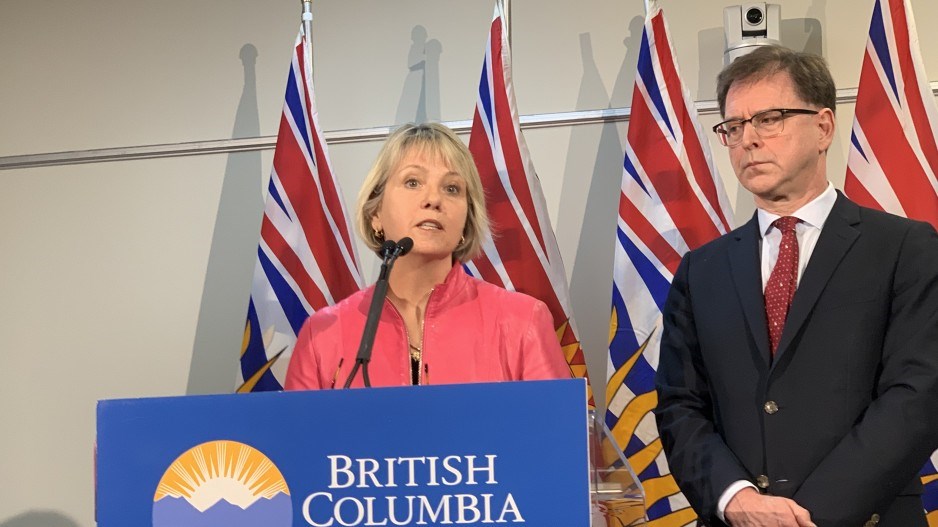B.C.'s provincial health officer Bonnie Henry and Health Minister Adrian Dix on March 12 urged all British Columbians not to leave Canada for any non-essential travel, even for a quick trip to the U.S., and that if they do, to self-isolate on their return.
"I think this is really important," Henry said. "It is clear at this time that the evolving situation both in the U.S. and globally is a risk for all of us and we are strongly advising people not to travel. If you do travel, anyone who chooses to travel outside of Canada will be required to stay away from work or school for 14 days on their return. We feel that this is an appropriate measure at this time given the situation that we've been seeing, given the importation of travel-related cases and the challenges that we have in monitoring them."
When asked by reporters at the news conference where she made her recommendation, Henry said the recommendation is "voluntary."
After Dix said that he understood that directing Canadian Border Services Agency staff is not B.C.'s jurisdiction, Henry said "the government of Canada will be making similar recommendations."
B.C. government staff and school staff will be required to take two weeks off work to self-isolate if they do leave the country, as that is something that the government does have the power to order.
Dix and Henry are also telling organizers to cancel any event that has more than 250 people. Schools, however, will remain open.
"We don't believe it is appropriate at the moment to close schools," she said. "They are a place where young people can be kept safe from a lot of things. They can learn about social distancing. We need to understand more about the role of young people in the transmission of this disease and we know that sometimes that the impacts of closing schools, particularly abruptly can cause a lot of societal disruption and economic impact. So we want to do that in a measured way."
Henry said that the rationale for the request not to travel is that her officials have a good sense of what is happening in Canada but they do not have that insight when it comes to the U.S. or other countries.
"The number of people travelling back and forth across the border with the U.S. is immense – thousands and thousands of people cross the border every day," Henry said. "That is a risk for us. People go to a whole bunch of things in the U.S. Many of those are now being cancelled. We know that a lot of conventions and events and things have been cancelled on both sides of the border. So that will drop down. The risk will decrease but right now one of our biggest risks is the U.S., not because it is out of control there but because we have so many people going back and forth. Even if a small proportion are exposed they can bring it home and that can be a challenge for us.
Earlier in the news conference Henry announced that B.C. saw seven new cases of COVID-19 in the past 24 hours and that the total is now 53 cases of the novel coronavirus that is particularly deadly for older people who have underlying health conditions. B.C. has so far had one death.
Two seniors' care homes have had outbreaks. The Lynn Valley Care Centre in North Vancouver has had many cases and, as of March 12, Hollyburn House in West Vancouver had one case – a man in his 90s.
Henry said that many Hollyburn House health care workers also work at Lynn Valley Care Centre. Two of the new cases of COVID-19 are health care workers who work at both facilities.
"They are a man and a woman both in their 40s and both are in isolation at home in the Fraser Health region," she said. "Obviously, we are continuing the investigation into the Lynn Valley Care Centre and now the connections with Hollyburn House. We do have many people who work in many different facilities and that has been part of the investigation to track down."
The other four new cases are in the Vancouver Coastal Health region, Henry said. Three of the people recently travelled. One, a male in his 40s travelled to the U.K., primarily the city of London, and Scotland. Two others, a male and a female who are both in their 40s, travelled to Egypt and took a cruise on the Nile River. The final new case is a man in his 50s who is now at home in isolation and in stable condition. Health officials in that final case have yet to determine a risk factor.
"We remain at one person right now who is in hospital – a woman in her 60s in Fraser Health," Henry said.
Six of the 53 cases have been tested twice and deemed to have recovered.
"That means they are no longer infectious to others as far as we know," Henry said.




